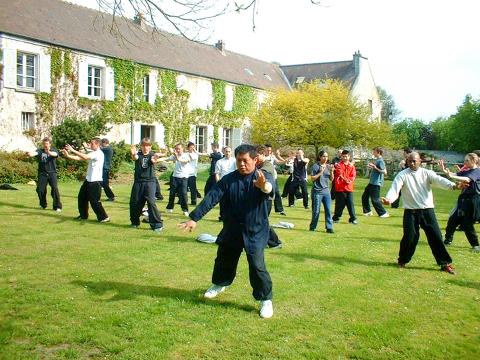Martial arts master and special forces combat trainer Liu Chang-i (劉長益) said he hopes to introduce the feeding crane style to the world as Taiwan’s distinctive martial arts form.
Liu, 55, has mastered the style and is a combat instructor for the army’s, marines’ and military police’s special service companies.
The companies last year jointly demonstrated their feeding crane-inspired hand-to-hand combat techniques at the Double Ten National Day ceremony, which Liu said made him proud.

Photo: Huang Hsu-lei, Taipei Times
The style’s emphasis on fast and deadly blows makes it suitable for military applications, where soldiers have to defeat the enemy quickly, Liu said.
“It was originally a fighting style for women. The point is to defeat the opponent immediately by using explosive power and striking at vital points, as women cannot win protracted struggles with men,” he said.
The style is said to have been created 400 years ago by Fang Qiniang (方七娘), who modified the Chinese white crane style for women’s self-defense, Liu said.
Fang’s system has four main traditions — the flying crane, singing crane, resting crane and feeding crane styles, the last of which was brought to Taiwan by Master Lin Te-shun (林德順) in 1927, he said.
Lin taught the feeding crane style to Liu’s grandfather and after that the title of the master passed from father to son, he said.
Learning the style at a young age, Liu said he began helping his father with teaching it from the age of 14 and started teaching his own classes when he was 21.
At the age of 32, Liu established a feeding crane style school in the US and he has since opened schools in Romania, Germany, Spain and France, he said, adding that he travels the world to teach the style.
Every Asian nation and culture around Taiwan has laid claim to a signature martial art, such as taichi, wing chun, karate, taekwondo, Muay Thai and escrima, he said.
“It is a shame that Taiwan does not have a representative martial art,” he said. “I want to leave behind something for the nation. I have vowed that I will travel to make the feeding crane style thrive all over the world,” he said.

Alain Robert, known as the "French Spider-Man," praised Alex Honnold as exceptionally well-prepared after the US climber completed a free solo ascent of Taipei 101 yesterday. Robert said Honnold's ascent of the 508m-tall skyscraper in just more than one-and-a-half hours without using safety ropes or equipment was a remarkable achievement. "This is my life," he said in an interview conducted in French, adding that he liked the feeling of being "on the edge of danger." The 63-year-old Frenchman climbed Taipei 101 using ropes in December 2004, taking about four hours to reach the top. On a one-to-10 scale of difficulty, Robert said Taipei 101

Nipah virus infection is to be officially listed as a category 5 notifiable infectious disease in Taiwan in March, while clinical treatment guidelines are being formulated, the Centers for Disease Control (CDC) said yesterday. With Nipah infections being reported in other countries and considering its relatively high fatality rate, the centers on Jan. 16 announced that it would be listed as a notifiable infectious disease to bolster the nation’s systematic early warning system and increase public awareness, the CDC said. Bangladesh reported four fatal cases last year in separate districts, with three linked to raw date palm sap consumption, CDC Epidemic Intelligence

Taiwanese and US defense groups are collaborating to introduce deployable, semi-autonomous manufacturing systems for drones and components in a boost to the nation’s supply chain resilience. Taiwan’s G-Tech Optroelectronics Corp subsidiary GTOC and the US’ Aerkomm Inc on Friday announced an agreement with fellow US-based Firestorm Lab to adopt the latter’s xCell, a technology featuring 3D printers fitted in 6.1m container units. The systems enable aerial platforms and parts to be produced in high volumes from dispersed nodes capable of rapid redeployment, to minimize the risk of enemy strikes and to meet field requirements, they said. Firestorm chief technology officer Ian Muceus said

MORE FALL: An investigation into one of Xi’s key cronies, part of a broader ‘anti-corruption’ drive, indicates that he might have a deep distrust in the military, an expert said China’s latest military purge underscores systemic risks in its shift from collective leadership to sole rule under Chinese President Xi Jinping (習近平), and could disrupt its chain of command and military capabilities, a national security official said yesterday. If decisionmaking within the Chinese Communist Party has become “irrational” under one-man rule, the Taiwan Strait and the regional situation must be approached with extreme caution, given unforeseen risks, they added. The anonymous official made the remarks as China’s Central Military Commission Vice Chairman Zhang Youxia (張又俠) and Joint Staff Department Chief of Staff Liu Zhenli (劉振立) were reportedly being investigated for suspected “serious